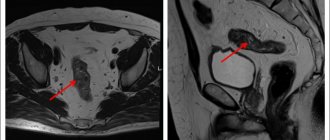Expert opinion
Professor E. S. Keshishyan says that “to one degree or another, intestinal dysfunctions occur in almost all young children and are a functional, to some extent conditional physiological state during the period of adaptation and maturation of the gastrointestinal tract of an infant. Intestinal colic is caused by the morphofunctional immaturity of the neuromuscular apparatus of the child’s intestines against the background of the immaturity of the enzyme system and the formation of intestinal microbiocenosis”**. Nevertheless, colic still remains the most poorly understood condition among the symptoms of digestive discomfort, so a variety of types of mixtures are used to treat its manifestations. In the treatment of symptoms of minimal digestive dysfunctions, such as colic, constipation, regurgitation, everything is important: whether the child was born full-term or not, naturally or by cesarean section (children born through cesarean section are characterized by a longer formation of intestinal microflora), whether it was breastfed or on artificial, mixed feeding and much more.
Nutrilon Comfort
Nutrilon Comfort for colic and constipation is designed specifically to solve this problem. This adapted baby food, made from hydrolyzed whey protein, has a low amount of lactose. The formula of the mixture is designed specifically for babies with problems with the gastrointestinal tract. Nutrilon Comfort also prevents the occurrence of such pathologies in absolutely healthy children.
| Infant Formula Ingredients | Impact on the child's body |
| Beta palmitic acid | Helps normalize intestinal motility, prevent constipation, and has a beneficial effect on the absorption of calcium in the body |
| Prebiotics in the form of galacto- and fructo-oligosaccharides | Maintains an optimal balance of intestinal microflora, strengthens the body's defenses, reduces the risk of developing infectious diseases of the gastrointestinal tract (gastrointestinal tract) |
| Polyunsaturated fatty acids | Supports the functioning and condition of the brain and central nervous system, promotes the proper functioning of the visual analyzer, and has a beneficial effect on the emotional state of the baby |
There are several formulas of Nutrilon Comfort baby food:
Causes of constipation in breastfed infants
- Nutrilon Comfort 1 – for newborns and infants up to six months;
- Nutrilon Comfort 2 – from six months and older.
If we compare the consistency of the mixture with other baby food options - in finished form - then it turns out to be thicker.
Increasing the density reduces the volume of air swallowed during sucking, which ultimately prevents the development of colic due to the increased content of gases in the intestines and constipation associated with increased gas formation.
Important! If your baby suffers from frequent constipation and severe colic attacks, Nutrilon Comfort can be used constantly.
The peculiarity of this type of product is the presence of a bitter aftertaste, so the child may refuse it. The reason for changing the diet is the lack of positive changes, i.e. the child continues to experience constipation and colic.
Cooking process:
- You should wash your hands and sterilize food utensils.
- Boil drinking water and keep it on low heat for at least 10 minutes. Let cool until warm.
- Measure the amount of water required according to the instructions on the Nutrilon Comfort package. Pour into a bottle.
- Add the mixture powder using a special measuring spoon. The required amount of mixture is also indicated in the instructions. Take spoons without heaping.
- Mix thoroughly to obtain a homogeneous mass.
- Before feeding your baby, it is important to check the food temperature. To do this, apply a drop of the mixture to the back of your wrist.
Before starting to use Nutrilon Comfort, it is important to make sure that the child does not have an allergic reaction to the components. Also, do not leave babies alone during feeding.
Is colic normal?
Yes, colic is a completely normal and natural physiological state for a newborn (given that there are no symptoms of dehydration, hunger or signs of serious illness). Digestive discomfort and restlessness, called colic, are present in 70% of infants from two weeks to 6 months of age. Since colic is not a disease, the child does not need treatment. However, caring parents still strive to alleviate his condition, so they turn to their doctor.
A little about physiology
A breastfed baby can go to the toilet as many times as he eats. Therefore, it is quite normal for his bowels to empty up to 7 times a day. In babies who are bottle-fed, bowel movements usually occur much less frequently (1-2 times a day). But at the same time, normally, stool is most often mushy.
Up to contents
It is important!
There can be several reasons for colic: from the immaturity of the baby’s gastrointestinal tract and disturbances in the composition of the intestinal microflora (the so-called dysbacteriosis) to more serious conditions.
Pediatrician A. A. Shcherbakova identifies the following reasons.
Transient lactase deficiency.
The carbohydrate lactose is an important component of breast milk or infant formula. To better break it down, an enzyme called lactase is needed. The first months of life are an important period of maturation of the child’s body, and at this time an insufficient amount of lactase may be produced in the baby’s digestive system (or its low activity is noted). In turn, its lack leads to difficulties with the breakdown of lactose. This is how transient (that is, temporary, passing) lactase deficiency occurs, causing colic.
Incorrect attachment of the baby to the breast (during breastfeeding and mixed feeding).
For proper feeding, the mother needs to be in a relaxed state, take a comfortable position and make sure that the baby grasps the nipple with the areola and does not swallow air. Babies who suck voraciously are at especially high risk of colic: they may swallow air, which enters the intestines and forms gas bubbles that cause discomfort.
Improper bottle feeding.
All modern bottles are equipped with a valve that releases excess air. There are also anti-colic bottles with anatomically shaped nipples that follow the contours of the female nipple. A comfortable and physiological grip on the nipple minimizes the likelihood of the baby systematically swallowing air during feeding.
Poor nutrition for a nursing mother.
Many researchers associate the occurrence of colic in infants with food allergies. Nowadays, many children are born with a predisposition to food allergies. For example, the most common cause of food allergies in young children is intolerance to cow's milk proteins. That is, for a mother who is breastfeeding and who has a family history of food allergies, it is better to limit or completely exclude products containing cow’s milk protein from her diet, since this causes an allergy in the child, and colic in such a case is an allergic reaction. If we talk about non-dairy products in a mother’s diet, then we can note the widespread opinion about legumes. In fact, legumes can affect the mother's bloating, but if she tolerates such foods well, then she can eat pea soup and other dishes - this will not affect the baby's colic.
Incorrectly selected milk formula.
Feeding a bottle-fed baby helps control colic. For example, cow's milk protein intolerance may be accompanied by colic. In this case, the formula based on whole cow's milk protein will most likely have to be changed.
The psychological and physical climate plays a big role in the nutrition of infants.
The main thing is to provide the baby with a favorable environment during feeding with direct contact between the nursing woman and the child. It is important that the mother looks at the baby, and he looks at the mother, and that nothing distracts them. When parents ask whether a cat, loud noises or bright lights can cause colic, the answer is of course not. However, external bright stimuli can become provocateurs of colic: create a nervous environment around the baby and lead to aerophagia.
Nutrilon for colic and constipation reviews
Dashulya has been suffering from gas colic since our arrival from the maternity hospital. It was a planned cesarean section, so dysbiosis was inevitable, as I later found out from many sources. After returning from the maternity hospital, the crying at home was constant, my daughter was sulking, she couldn’t get away with it at all, it was simply unrealistic to put her anywhere. We slept like this together, in an embrace, I simply passed out without strength, she lay on me, fixed in my arms. Because of colic and this condition, my girl refused to suckle, this process brought her suffering and I saw it, so I had to start giving formula. However, in the maternity hospital she was very well accustomed to this, because... They brought her to me well-fed and sleepy all the time, even though I didn’t ask and didn’t shower the staff with sweets. The consequence of this was the disappearance of milk. Perhaps with the next babies that my husband and I are planning, I will be tougher and unbending towards the guards, but my nerves and strength were completely lacking with Dashulya. Now, having read a lot about the benefits of natural feeding, I blame myself terribly for not being strong enough to insist on my own and establish the process of breastfeeding. As a result, now we eat Nutrilon Comfort and fight Staphylococcus, Klebsiella and green poop. Initially, we contacted the Gabrichevsky Institute and took tests (for carbohydrates, dysbacteriosis, caprology). Lactase deficiency was detected, Staff 10*4, Klebsiela 10*8. We were prescribed lactazar for food, chlorophyllipt 1% alcohol for 3 weeks. After the course of treatment, the colic continued to be severe, constipation appeared - they managed with a tube. Then we went to the Sechenov Institute, where they prescribed kip, normoflorins L and B. I read a lot of good reviews about these drugs, but when we started taking them, we started having green stools once a day or once every two days. And not just particles of greenery, it is all the color of dark green leaves, the smell is very unpleasant and sour. This state of stool has been going on for a month now, while the colic has decreased significantly, I can say that my daughter feels like a solid B, smiles often and her development is normal. Again, I read that the stool can be completely different, but such greenness within a month again plunged me into panic. We contacted our local pediatrician and prescribed pyobacteriophage for 7 days. He said that the tests should be taken after the course of pyobacteriophage. Dear BBeshki, tell me whether it is worth treating and how you defeated this infection, if anyone has encountered and defeated the staff. Thanks in advance for your comments.
It is important!
It is often enough to reassure the parents and wait until the baby outgrows this condition without changing the diet.
It must be remembered that a change in diet is a serious stress for a newborn. Which mixture is suitable for a baby with colic can only be determined by the doctor observing the child. It is very important whether the colic is isolated as a painful spastic syndrome or is it combined with other digestive disorders (colic, regurgitation, constipation). The choice of mixture depends on this.
What may indicate that your baby is constipated?
The following signs can help identify constipation in a newborn who is bottle-fed:
- rare acts of defecation (less than 6 times a week and 1 time a day);
- stool consistency is too dense (in the form of balls or sausages);
- flatulence (the abdomen becomes tight and swollen, which can be easily checked with a light massage, while the baby presses his legs to his stomach and twists them);
- pain and discomfort during bowel movements (the child strains a lot, blushes and cries);
- irritability and moodiness;
- loss of appetite, poor sleep;
- rashes on the body (may occur due to intoxication of the body caused by the accumulation of feces in the intestines).
Up to contents
What does Nutrilak offer?
Hypoallergenic mixtures, for example Nutrilak Premium hypoallergenic, are suitable for a baby at risk of food allergies (if there are allergy sufferers in the family). This mixture is recommended for colic at a very early age, when colic is a manifestation of the immaturity of the digestive system and sensitivity to cow's milk protein. This product contains unique LGG® bifidobacteria and provides triple protection against allergies.
More often, colic is combined with constipation or regurgitation. For constipation ,
accompanying colic, one of the effective correction options is a specialized mixture of Nutrilak Premium anti-reflux with natural locust bean gum fibers. Natural gum works as dietary fiber, improves intestinal function, and also promotes the growth of beneficial bifidobacteria and lactobacilli in the intestines. Improving the state of microflora and regular bowel movements help eliminate colic and constipation.
The Nutrilak Premium fermented milk mixture has also proven itself well in the diet therapy of colic syndrome, accompanied by other digestive disorders (regurgitation, constipation). Fermented milk products have long been used to treat digestive disorders, and for babies, adapted fermented milk formulas have become a lifesaver because they can be used from a very early age. The product contains LGG® lactic acid bacteria complex and provides triple aid to baby's digestion.
Links:
*Savino F, Pelle E, Palumeri E, et al. Treatment of intestinal colic in infants: a comparison of the effectiveness of Lactobacillus reuteri (American Type Cuture Collection Strain 55730) and Simethicone (prospective randomized trial). Consilium medicum. 2007.
** Keshishyan E.S. Intestinal colic and correction of microbial colonization in children in the first months of life: Clinic. Differential diagnosis. Approaches to therapy. Lecture for doctors. M., 2007.
Composition of baby food
The infant formula is completely balanced. Nutrition can satisfy all the newborn’s needs for essential substances, since its composition is as close as possible to the composition of breast milk. Therefore, the mixture is well absorbed by the intestines, preventing the development of colic and constipation.
Important! With a mixed type of feeding, Nutrilon will be an excellent choice if the baby has digestive problems.
The product contains:
- unsaturated, easy-to-digest fatty acids;
- the most necessary vitamins and minerals for a developing organism;
- proteins, fats and carbohydrates in the required proportions;
- mucus and gum;
- phosphorus;
- calcium;
- prebiotics;
- casein;
- lactic acid bacteria identical in composition to those found in breast milk.
It is thanks to the presence of casein, lactic acid bacteria and prebiotics in the mixture that Nutrilon improves the functioning of the intestinal tract, normalizes the course of digestive processes, and also eliminates existing disorders.
The mixture is selected depending on the age of the baby
While breastfeeding, intestinal peristalsis (contractility) improves and the production of digestive enzymes necessary for the absorption and processing of food entering the intestine improves. In addition, stool softens. But in order to get the expected effect, it is necessary to take into account the existing problem and the characteristics of the child’s body.









